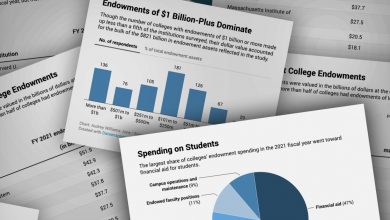A New Study Says Long Covid Lingers on College Campuses

[ad_1]
College leaders will have to continue contending with the reality that long Covid remains an issue on campuses, according to a study published Thursday by researchers at George Washington University.
The study examined 1,338 cases of Covid-19 identified through on-campus testing of students, faculty, and staff at George Washington between July 2021 and March 2022. The university mandated that students and employees be fully vaccinated by August 2021 and receive a booster by March 2022.
Of the 1,338 cases, 36 percent of people reported experiencing symptoms consistent with long Covid. Nearly three-quarters of respondents were students; the rest were faculty or staff. The median age of respondents was 23 years old, and 63.4 percent of respondents were women.
Long Covid is defined by the U.S. Department of Health and Human Services as signs, symptoms, and conditions that continue or develop four weeks or more after someone has been infected with Covid for the first time. U.S. Census Bureau data show that nearly one-in-five American adults who have contracted the virus still experience symptoms consistent with long Covid.
The GW study found that fully vaccinated people were less at risk of developing long Covid, while people with underlying medical conditions, current or former smokers, women, and people who experienced more severe symptoms during their initial infection were more at risk.
Lynn R. Goldman, the study’s lead author and dean of the George Washington Milken Institute School of Public Health, said the study demonstrates why colleges should continue mitigation strategies to slow the spread of the virus. Campuses also should be attentive to accommodations that students, faculty, and staff with lingering Covid symptoms might need, she said.
“We need to continue to do everything we can to prevent people from getting Covid, even though things have changed,” Goldman said.
Rebecca Smith, an associate professor of epidemiology at the University of Illinois at Urbana-Champaign, said the study justifies the concerns among colleges at the outset of the pandemic about allowing Covid to circulate among students. Many institutions kept classes primarily or entirely online in fall 2020 and spring 2021, before vaccines were widely available.
“This article shows that those concerns were reasonable,” Smith said.
This academic year, colleges have largely done away with mask requirements, and some have also ditched vaccination mandates. Many institutions published and regularly updated dashboards that tracked campus Covid cases during the height of the pandemic; those have become less common. The GW study urges caution in rolling back those measures.
As we return to face-to-face classes, we have to face the fact that this disease is not going away.
A study published last year found that colleges’ vaccination mandates significantly decreased the number of U.S. deaths from the virus.
As colleges look to protect students against the possibility of contracting long Covid today, the new study demonstrates the need for strong vaccination policies on campuses, said Georges C. Benjamin, executive director of the American Public Health Association. Benjamin added that colleges should ensure isolation and quarantine policies remain up-to-date and that their health systems are capturing the prevalence of Covid on campus.
“As we return to face-to-face classes, we have to face the fact that this disease is not going away,” Benjamin said.
Beyond higher education, Goldman noted that the study’s findings could also apply to healthy, working-age populations.
“When you look at well-defined populations such as ours, the risk of long Covid is there for people across the entire age range and we need to take that seriously,” Goldman said. “[Fairly healthy people] are at risk for this, and that has an impact on being able to operate.”
Goldman said future research should examine additional risk factors, as well as the duration and severity of symptoms for those who suffer from long Covid.
“We’re kind of done with Covid, but I don’t think Covid is done with us,” Goldman said.
[ad_2]
Source link






